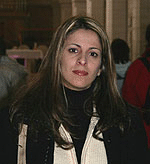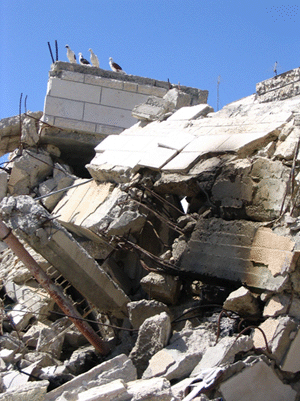Elana Rozenman is an American-born Jew who has made Aliyah, the Hebrew word for the permanent move to

[Ghada Issa,
–
Ghada Issa is a Palestinian Muslim woman, the Program Coordinator of Hope Flowers School and the daughter of its founder. She is also a member of women’s circle within the Peace X Peace Global Network. “My father’s family had been living in the Arab
Her words hang in the air, not an accusation, but a counterweight. Elana’s husband’s family could have moved onto Ghada’s father’s land. One family became refugees at the exact moment another’s family stopped being so. And yet these women sit next to each other, conversing openly about how to work together to heal the wounds of their communities and stop the violence of both suicide bombers and soldiers. They recognize that animosity towards each other will only worsen the situation, and so they choose to communicate and affirm each other’s truths.
There are hundreds of thousands refugees from the 1948 war scattered throughout
Before I came to
I visited Dheisheh Refugee Camp, where Ghada Issa and her family had grown up. Jihad Ramadan, a 23 year old man and life-long resident of the camp took me on a tour of the camp and shared his story. He says there are approximately 11,000 refugees from the 1948 war in the camp, “squeezed into less than one square kilometer of land that was completely fenced in and isolated from the surrounding communities until about ten years ago, when residents tore the fence down. All that remains is the front gate, open on either side.”
Jihad’s family came to Dheisheh in 1948, refugees from the war, and he has snuck back to see the ruins of his village only once. A glass case in the
Dheisheh, despite its crowded living conditions, perpetual garbage overload, and minimal medical facilities, is one of the nicer refugee camps. Originally featuring a tent city, it now is a swath of cinderblock houses, the first room of each built by the United Nations. Families save shekel by shekel (one shekel equals about twenty cents) to make additional rooms as marriages and babies expand their numbers.
A woman who invited me into her home for tea has lived in the camp her entire life, 51 years, and has raised five children there. Her mother arrived to Dheisheh in 1954, having been displaced from her village six years prior, and because there is virtually no economy in the camp, it has been impossible to move anywhere else. She says she wants her children to leave and start life somewhere better, but this community is all the family knows. She has the thick-skinned look of a woman who has lived a hard life, but her children hop from place to place with joyful exuberance.
Her home is modest, the wall adorned only with a portrait of her oldest son who was jailed years ago for participating in the Intifada. When the Israeli soldiers came to arrest him, they bulldozed his home, which was attached to the family compound. I am taken to see the smooth new concrete structure they have rebuilt where this prodigal son’s home once stood. It took all their savings, but it is a triumph over the occupation that they have been able to rebuild. Many families cannot afford to, and the smashed concrete lingers as an Israeli message to the community not to try to resist.

[Palestinian home bulldozed by Israeli Defence Forces, Al Khadr,
–
Her home is modest, the wall adorned only with a portrait of her oldest son who was jailed years ago for participating in the Intifada. When the Israeli soldiers came to arrest him, they bulldozed his home, which was attached to the family compound. I am taken to see the smooth new concrete structure they have rebuilt where this prodigal son’s home once stood. It took all their savings, but it is a triumph over the occupation that they have been able to rebuild. Many families cannot afford to, and the smashed concrete lingers as an Israeli message to the community not to try to resist.
For more information about Peace X Peace, please visit www.peacexpeace.org, for more about the
